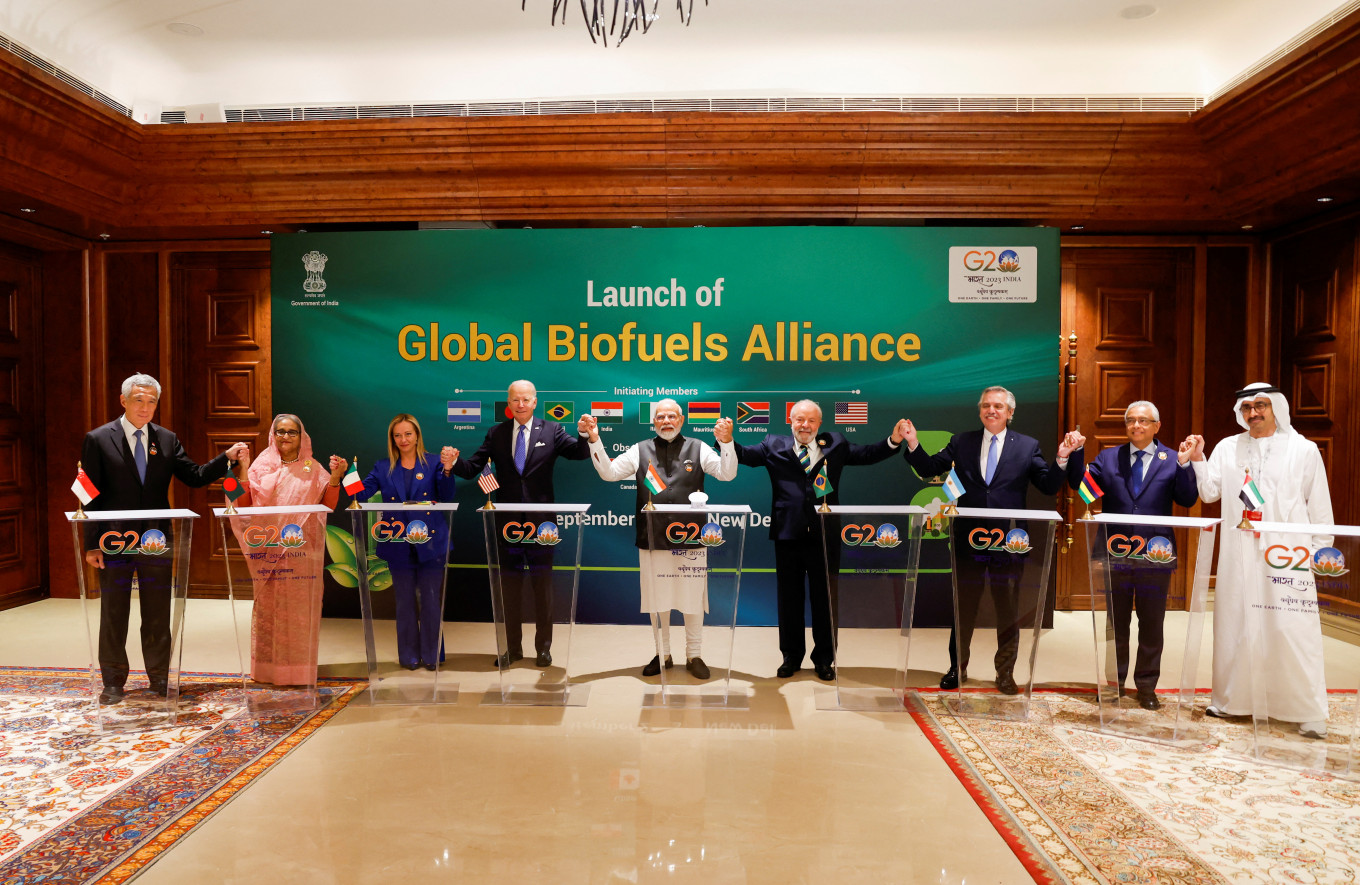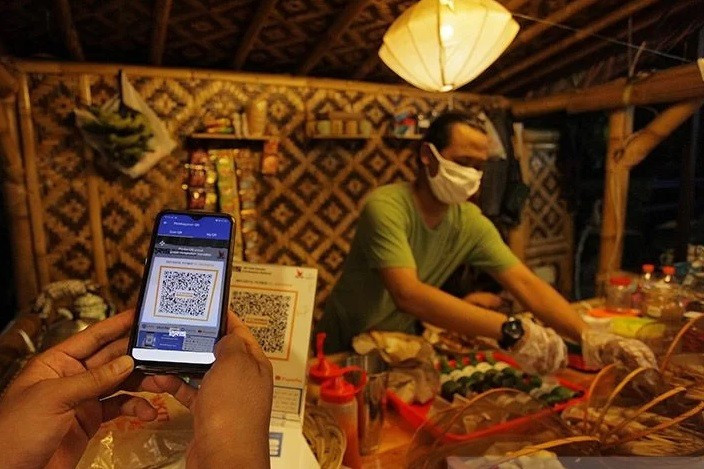Popular Reads
Top Results
Can't find what you're looking for?
View all search resultsPopular Reads
Top Results
Can't find what you're looking for?
View all search resultsG20 summit reveals a mixed outlook
Defying all dire predictions, the leaders of the G20 nations managed to piece together a consensus statement on the first day of the two-day summit, though not without revealing the deep-seated divisions within their ranks.
Change text size
Gift Premium Articles
to Anyone
 Singapore Prime Minister Lee Hsien Loong, Bangladesh Prime Minister Sheikh Hasina, Italian Prime Minister Giorgia Meloni, US President Joe Biden, Indian Prime Minister Narendra Modi, Brazilian President Luiz Inacio Lula da Silva, President of Argentina, Alberto Fernandez, Mauritius Prime Minister Pravind Kumar Jugnauth and Foreign Minister of United Arab Emirates, Sheikh Abdullah bin Zayed Al Nahyan attend the launch of the Global Biofuels Alliance at the G20 summit in New Delhi, India, September 9, 2023. (Reuters/Evelyn Hockstein)
Singapore Prime Minister Lee Hsien Loong, Bangladesh Prime Minister Sheikh Hasina, Italian Prime Minister Giorgia Meloni, US President Joe Biden, Indian Prime Minister Narendra Modi, Brazilian President Luiz Inacio Lula da Silva, President of Argentina, Alberto Fernandez, Mauritius Prime Minister Pravind Kumar Jugnauth and Foreign Minister of United Arab Emirates, Sheikh Abdullah bin Zayed Al Nahyan attend the launch of the Global Biofuels Alliance at the G20 summit in New Delhi, India, September 9, 2023. (Reuters/Evelyn Hockstein)

In the realm of cold, hard facts, the Group of 20 summit, while not without its merits such as the inclusion of the African Union (AU), has, regrettably, left much to be desired. This gathering, when assessed in the context of two pressing and pivotal issues demanding the utmost attention from its participants—namely, climate change and the intricate matter of sovereign debt restructuring—has been nothing short of lackluster and disheartening.
Despite exhaustive talks over the past years, the G20 nations have yet to reach pragmatic and harmonious resolutions on both crucial matters. In the New Delhi declaration, there was a notable absence of fresh commitments to reduce coal usage compared to the previous Bali summit.
However, the declaration did introduce the creation of a Green Hydrogen Innovation Centre, a pledge to triple renewable energy production by 2030, the initiation of a global biofuels alliance, and a shift in the discourse on finance from billions to trillions, signaling some progress on critical environmental fronts.
Within the joint statement, the G20 summit grappled with an array of issues encompassing climate financing, the global debt conundrum, institutional overhauls like the World Bank, and the inception of a fresh "green development pact" among its member nations. What was once envisioned as a forum primarily aimed at tackling pressing concerns such as food security, debt governance, and climate transformation has morphed into a multifaceted arena for navigating the intricate tapestry of global geopolitics.
The summit's lofty aspirations have been marred by deepening schisms, most notably exemplified by the ongoing Ukrainian crisis. These divisions have hindered the G20 nations from forging a consensus, even on the most fundamental matters.
The G20 summit marked a notable milestone with the inclusion of the AU as a permanent member, symbolizing a rare instance of consensus among global economic giants. Yet, despite this heartening development, concerns about the summit's unity and the challenges surrounding the crafting of a joint declaration persist.
It's a triumph for the AU, whose full-fledged entry into the G20 is a significant accomplishment. China emerged as a prominent supporter of the AU's G20 membership, emphasizing the AU's potential to assume a greater role in global governance. This admission stands as a beacon of progress toward the reforms advocated for in various spheres, including the United Nations Security Council and multilateral financial institutions.
The G20's welcoming embrace of the AU reflects a positive step toward a more inclusive and reformed global order. The heartening addition of the AU as a permanent member of the G20 marks a rare moment of consensus among the world's major economic giants.
Nevertheless, the road to a final statement was far from smooth, with the contentious matter of Russia's actions in Ukraine causing friction. The compromise reached, while not ideal, allowed for an official statement to be signed off.
However, achieving this consensus required a delicate dance, notably involving the tempering of language regarding Russia's conflict in Ukraine. The recent G20 summit stands out as one of the most challenging in the forum's nearly two-decade history. Crafting the declaration consumed nearly 20 days prior to the summit and an additional five on-site.
Discord not only revolved around Ukraine but also spanned crucial concerns like climate change and the shift toward low-carbon energy. However, the Ukraine conflict proved to be the most contentious point of contention in these intricate negotiations. Until the 11th hour on Friday, an unsettling void had occupied the joint statement regarding the Ukraine conflict at the G20 summit.
The section dedicated to the "geopolitical situation" had eerily remained empty. European nations had been fervently pushing for strong language to denounce Russia's incursion, but the stalwart opposition from Russia and China persuaded them from any mention of the war.
Such diplomatic wrangling, emblematic of the complexities inherent in international gatherings, underscores the arduous task of balancing divergent interests and viewpoints within the G20's ambit.
Amid widespread skepticism, there hung a cloud of doubt over the release of a final communique at the G20 summit, a scenario that would have marked a historic departure and dealt a blow to the prestige of the G20 itself. However, defying all dire predictions, the leaders of the G20 nations managed to piece together a consensus statement on the first day of the two-day summit, though not without revealing the deep-seated divisions within their ranks.
The compromise on the Ukraine conflict's vocabulary was notably diluted, a stark reminder of the palpable tensions among these global power players. The final statement, released just a day before the summit's formal conclusion, emphasized the "human suffering and negative consequences of the conflict in Ukraine" without explicitly blaming and naming Russia.
Instead, it invoked the UN charter, stressing that "all states should refrain from using force or threats to acquire territory, infringe on territorial integrity, sovereignty, or political independence of any state, and deeming the use or threat of nuclear weapons unacceptable". In stark contrast, the Bali declaration had directly referenced a UN resolution condemning "the aggression by the Russian Federation against Ukraine" and expressed that "most members strongly condemned the war in Ukraine". This shift in language reflects the intricate diplomatic squabble occurring within the G20.
In a dramatic move on the sidelines of the summit, India unveiled a multinational rail and shipping endeavor connecting India, the Middle East, and Europe. This strategic corridor, involving India, Saudi Arabia, UAE, Jordan, Israel, and the EU, poses a formidable challenge to China's Belt and Road Initiative, aiming to enhance trade, energy access, and digital connectivity in the region.
Simultaneously, Ursula von der Leyen, President of the European Commission, also announced a "Trans-African Corridor" linking Angola's Lobito port with landlocked regions, including Kananga in the Democratic Republic of Congo and Zambia's copper-mining areas. US President Biden lauded this African initiative as a "game-changing regional investment," emphasizing their collective significance as monumental strides forward.
Interestingly, it appears that both corridors have been announced by the US, in collaboration with India and the EU, in haste to challenge the BRI without any proper working and planning. Notably, crucial project specifics such as funding, geographical locations, and timelines remain undisclosed, raising questions about the thoroughness of the planning process.
As per Amos Hochstein, Biden’s coordinator for global infrastructure and energy security, over the next 60 days, dedicated working groups will craft a comprehensive plan and establish precise timelines. The initial phase will focus on pinpointing areas requiring investment and interconnecting physical infrastructure across nations.
The G20 undeniably serves as a crucial platform for addressing global issues, and its character is evolving with the growing influence of developing nations like China, South Africa, India and other African countries. This expansion of voices within the G20 is diluting the once-unilateral dominance of the Western narrative.
As the world becomes more multipolar, the G20's dynamics continue to shift, and the global stage becomes more complex, the path forward for international cooperation remains anything but straightforward.
***
The writer is a Karachi-based international affairs analyst.










